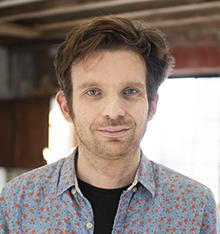Oliver Broadbent
Engineering design is a highly creative process, yet the embedding of such creativity as a key graduate attribute is not always central to university-based engineering education. Oliver Broadbent has devoted his career to fixing this.
His starting point is that creativity is a skill that can and should be taught to engineers, and he has developed a multi-stepped process for making this happen in universities and industry.
The first is to set out a series of tools and approaches that can be used for teaching creativity. The starting point is his ‘Kalideascope’ model for understanding how to have ideas (what could possibly be more important in engineering design?). He uses systems thinking tools for understanding how creativity is developed in teams. He uses behavioural tools to help people understand how design team dynamics and shaped and influenced. He is now using tools from physical theatre to help engineers access new creative thinking and overcoming vulnerability in design.
Many of these tools are summarised in his chapter ‘How to have ideas’ in the Institution of Structural Engineers book ‘Conceptual Design of Buildings’, which is quickly becoming a popular reference book for students and early-career professionals.
His second step is to have been working to embed creativity in university teaching courses themselves, for example through his prestigious Royal Academy of Engineering Visiting Professorship appointment at Imperial College, through writing curriculum guidance and developing CPD to develop staff skills in teaching creativity. Here he has had a particular focus on training staff in using problem-based learning to teach creativity, which is having a transformative impact on how staff view teaching creativity.
Thirdly, he has developed a range of CPD courses to industry to try to influence those who missed his influence while they were studying.
Over the past decade Oliver has simultaneously led the way in ensuring that the climate emergency is a central driver in engineering design. His leadership in this area is extraordinary. It started with him writing the sustainability guidelines for civil engineering design accreditation requirements a decade ago. Today, his leadership in design skills encompasses the most important of messages: the climate emergency must drive a creative response from engineers as never before. Oliver has the tools to achieve just this, and to inspire students and graduates to realise that the climate emergency does not represent austerity – it represents the greatest possible opportunity for engineers to flex their creative skills in the most exciting way.

Constructivist Ltd




